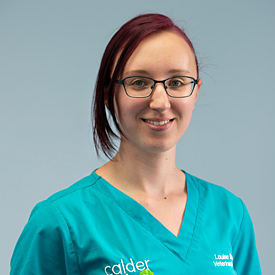
May is Veterinary Nursing Awareness Month, a whole month dedicated to raising awareness of the veterinary nursing profession and the vital role they play in animal care and treatment.
What was started as an awareness day by the British Veterinary Nursing Association (BVNA) in 2005 quickly grew into a week and expanded even further to a month in 2012.
Louise Bardon is a veterinary nurse at Calder Vets’ Dewsbury practice and she kindly took time out to tell us about life as a vet nurse.
How long have you been a vet nurse and what training did you have to do to achieve your qualifications?
I have worked at Calder for just over eight years. In October 2014 I began a Level 3 Diploma course at Myerscough College. The course lasted two years and I had to spend two weeks away at college every other month to go to lectures, write assignments and sit exams. While at work I had practical, on-the-job training to learn all the skills required to become an RVN and in March 2017 I was entered on to the RCVS register of veterinary nurses.
What attracted you to a career as a vet nurse?
Originally I wanted to be a firefighter! Unfortunately my eyesight was too poor so I spoke to a careers advisor who suggested looking into the animal field and veterinary nurse jumped out at me. To be honest, I had no real clue as to how complex the field was. It’s not just puppy cuddling!
What are the best things about being a vet nurse?
My favourite thing is seeing the difference you can make to animals as you care for them. It’s the little things you can do to make their stay at the vets that much easier and more comfortable for them. Being able to read their body language and alter your care for their individual needs really makes all the difference in a patient’s recovery.
As a surgical nurse I get to assist with a range of surgical procedures as well as undertaking Schedule 3 nurse surgery, train newer members of staff and oversee the daily running of theatre.
What kind of attributes do you need to be a good vet nurse?
You need patience, both with your patients and their owners. Animals can have a range of issues from separation anxiety to fear aggression and it can take quite a while to gain their trust and be able to handle and treat them.
You need empathy. It’s not always easy to understand how an animal is feeling and not every animal shows how it’s feeling in the same way. A dog who spends all day barking at the front of the kennel giving you a headache may be anxious and scared, not just boisterous, as it first seems.
You need organisation, whether it be down in the kennels looking after inpatients all day and giving medications, or in the prep room organising the day’s op list and making sure every vet has a nurse to work with.
What advice would you give someone thinking about a career as a vet nurse?
Do your research on the job before accepting a position. It takes a long time to feel confident and learn all the skills you’ll need to do the job, you can’t just walk into practice and start nursing on day one. Some practices also have longer waiting lists for the college course so you may have a while not being able to do too much in practice until a course becomes available.
What are the best things about working at Calder Vets?
The variety of cases is amazing, we see dogs and cats and also rabbits, guinea pigs and rats. Some cases are simple and can be treated with a few medications where as some require admitting into hospital, having medical tests and need more intensive nursing care.
We have multiple machines and equipment including x-ray, CT and endoscopy so it’s a great place to keep your skills up-to-date.
You can find out more here about Vet Nurse Awareness Month.


News